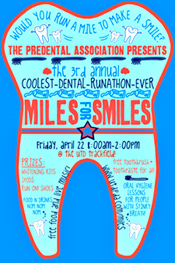Students taking notes in the shadow of a 4-foot tooth displayed on the wall of a Science Learning Center classroom were in uncharted territory: the new Oral Histology class, the first UT Dallas course designed specifically for aspiring dentists.

Pre-Dental Fundraiser
to Help Poor Afford Care
The UT Dallas Pre-Dental Association has organized Miles for Smiles to raise money for Dallas-area people who are unable to afford adequate dental care. The event will be Friday, April 22, from 7 a.m. to 2 p.m., on the UT Dallas track field. Students, faculty and public are invited any time during the event to run or walk to the music of a live DJ. Local sponsors and dentists will make donations dependent upon the number of miles accumulated during the “runathon.” All proceeds will go toward the Baylor College of Dentistry Social Services Dental Care Fund. Details are available at the Miles for Smiles website.
Led by retired Col. David Murchison, DDS, former director of dental policy and operations for the United States Air Force, the course teaches students the structure and function of the cells and tissues in the mouth and related regions. Murchison weaves lectures with insights from his personal clinical experiences and treatment developments in many of the specialties in the field of dentistry.
“The information is all new, and it’s so specific,” said Ken Pham, BS ’10, a post-baccalaureate student in Murchison’s class. “After shadowing a local dentist for eight months, I wanted to go further. I saw procedures and ways of doing things but didn’t know why they happened. Dr. Murchison explains why things are done in clinical practice.
“This course definitely strengthens my applications to dental schools.”
Histology Course Gives Pre-Dental Students an Edge
Dr. Scott Wright, associate dean of undergraduate education and director of the University’s Health Professions Advising Center, sought a way to provide students with a steppingstone to dental school. His contacts at professional programs had told him the Oral Histology course taken in dental schools traditionally was a stumbling block.
“I have had, over the years, many conversations with dental school admissions officers who encouraged us to have a course in histology,” he said. “I had wanted to offer it for a long time.”
Enter Murchison. After three decades of military service around the world, including command of the 35th Dental Squadron located at Misawa Air Base in Japan, Murchison wanted to turn his experience into a meaningful second career. He became aware of UT Dallas and its pre-health advising program when one of his children was researching universities and was impressed by the institution’s academic rigor.
Since instruction and clinical practice had been a part of his work with the Air Force, Wright asked Murchison to develop and teach the histology course. In spring 2011 the class was launched. Thirty-one students enrolled initially; more were on a waiting list.
“My students are smart, dedicated and engaged,” said Murchison. “During the first class meeting, I told them about my expectations, and they have not let me down.”
Instructor’s Other Duties Aid Dental School Applicants
In addition to his teaching duties, Murchison advises pre-dental students through the HPAC, works with the Pre-Dental Student Association and speaks to freshmen who are considering a career in dentistry. His one-on-one advising helped Deeba Korous, a registered nurse who hopes to become a dentist, appreciate the interplay of health care fields.
“Through a discussion of oral structures like the palate and associated complications such as cleft lips, Dr. Murchison helped me understand the interdisciplinary nature of dentistry and medicine,” Korous said. “I now see the importance of cross-communication and a medical-dental team approach in a young patient’s outcome.”
Murchison calls his teaching and advising experience at UT Dallas thus far “very satisfying” and enjoys sharing benefits – and the rigors – of dentistry with students considering the profession.
“To be a good dentist, one needs to do more than study hard to separate yourself from your peers academically,” Murchison said. “Students also should possess fine motor skills, an empathetic nature and an absolute dedication to quality, because patients expect it.
“Dentistry can be a huge life-changer for the patient, delivering aesthetic improvements, a return of dental function and relief of pain. For the dentist, in terms of practice satisfaction and of self-actualization, it is an incomparable career.”